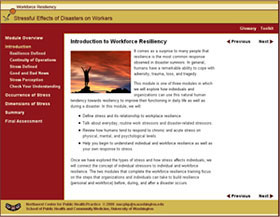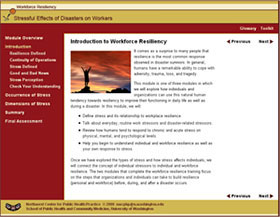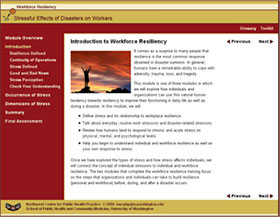Description
Stress infiltrates our lives every day and has effects beyond what we usually realize. This 45-minute online course is part one of the Workforce Resiliency series, which provides information about individual and organizational resiliency in the face of stress, emergencies, and disasters. In this installment, you learn how to define stress and the effects that stress has on your behavior, biology, and psychology in both day to day and disaster situations.
Learning Objectives
- Define stress and discuss its relationship to workplace performance
- List and describe various routine work-related stressors as well as likely disaster-related stressors
- Explain the psychological, social, behavioral, biological, and physical elements of acute stress and how these aspects relate to one another
- Describe the characteristics of both individual and workforce resilience in the context of disasters
Intended Audience
Public health administrators and managers; other public health professionals; nurses; first responders; and rescue workers
Workforce Resiliency Series
Part One: Stressful Effects of Disasters on Workers
Part Two: Individual and Organizational Preparedness
Part Three: During and After a Disaster
Format
These online courses have interactive exercises. Each course takes approximately forty-five minutes to complete.
Course Instructor
Randal Beaton, PhD, EMT
Research Professor, School of Nursing
Adjunct Research Professor, Health Services
Northwest Center for Public Health Practice
School of Public Health, University of Washington
Technical Requirements
These courses require certain software and browser plugins to be installed. See our Technical Requirements page for details.
Accessibility
This online training course is text-based and designed for accessibility. Please note that the print version does not include interactive exercises, quizzes, or the final assessment. Flash-based interactive exercises and quizzes in the course may not be accessible to screen readers. To receive a print version of the course, please contact nwcphp@uw.edu. If you have any difficulties in accessing the information given in any of our documents or need further assistance, please contact nwcphp@uw.edu.


